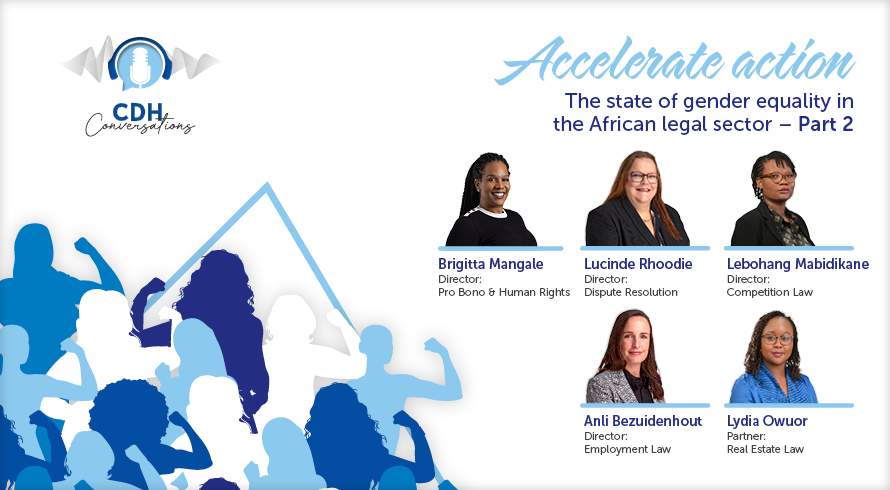Business and human rights: An emerging sector in South Africa and new offering at CDH
BHR enables and requires a business to avoid, mitigate, respect and remedy its involvement in human rights abuses that may occur as a direct or indirect result of a business or a third party’s business operations or involvement.
Businesses have human rights responsibilities towards the people and environments that are affected by its business operations and, where these responsibilities are not explicitly set out by domestic law, businesses are encouraged to take guidance from international human rights norms, best practices, treaties and standards which contain BHR commitments. The impact of businesses on human rights should be evaluated prior to the commencement of operations or activities and be consistently monitored. Potential violations ought to be prevented or detected and responded to from the outset.
A specific focus of BHR is on the rights of indigenous people; women; national, ethnic, religious and linguistic minorities; children; persons with disabilities; migrant workers; and any other vulnerable groups of society who are at a high risk of having their human rights violated by the activities of a business. An action plan should be developed with management strategies to address specific risks which may arise in respect of categories such as cultural heritage; environmental management and conservation; health and safety; governance and ethics; security and human rights; transformation; human rights at the workplace; child labour and modern slavery; and land use and resettlements.
Global standards
The United Nations Guiding Principles on BHR (UNGPs) are the global standard on BHR and govern BHR obligations. Although the UNGPs are not binding, they are the most authoritative international principles to date in respect of BHR. They are based on three pillars: protect, respect and remedy. Each of these pillars defines concrete measures for governments and companies to meet their respective duties and responsibilities in order to prevent human rights abuses in company operations and provide remedies if such abuses take place. The UNGPs affirm that business enterprises must prevent, mitigate and, where appropriate, remedy human rights abuses that they cause or contribute to.
In order to meet the corporate responsibility to respect and protect human rights, the UNGPs identify three components of corporate responsibility: corporations must institute a policy commitment to meet the responsibility to respect human rights; corporations must undertake ongoing human rights due diligences to identify, prevent, mitigate and account for their human rights impacts; and corporations must have processes in place to enable remediation for any adverse human rights impacts they cause or contribute to. This is equally important when a merger or a corporate acquisition is contemplated – does any corporate want to take on the legal risks that a target has which arise from BHR violations?
The most recent development underway in international law, the draft treaty titled: “Legally binding instrument to regulate, in international human rights law, the activities of transnational corporations and other business enterprises” (Draft Treaty) proposes introducing liability for juristic entities for human rights abuses that may arise from their business activities. It further proposes that states must ensure that their domestic laws provide for the liability of corporations for their failure to prevent an entity or natural person that they control, manage or supervise from causing or contributing to human rights abuses. Liability also extends to circumstances where the controlling legal entity should have foreseen risks of human rights abuses in the conduct of the business activities of other entities that they control, including those of a transnational character, but failed to take adequate measures to prevent the human rights abuse.
Cliffe Dekker Hofmeyr is proud to announce its offering of advice on BHR and would like to encourage clients and businesses alike to adhere to BHR principles and incorporate them into plans and policies. Failure to introduce and implement BHR principles would lead to reputational, financial and legal risks.
The information and material published on this website is provided for general purposes only and does not constitute legal advice. We make every effort to ensure that the content is updated regularly and to offer the most current and accurate information. Please consult one of our lawyers on any specific legal problem or matter. We accept no responsibility for any loss or damage, whether direct or consequential, which may arise from reliance on the information contained in these pages. Please refer to our full terms and conditions. Copyright © 2025 Cliffe Dekker Hofmeyr. All rights reserved. For permission to reproduce an article or publication, please contact us cliffedekkerhofmeyr@cdhlegal.com.
Subscribe
We support our clients’ strategic and operational needs by offering innovative, integrated and high quality thought leadership. To stay up to date on the latest legal developments that may potentially impact your business, subscribe to our alerts, seminar and webinar invitations.
Subscribe



